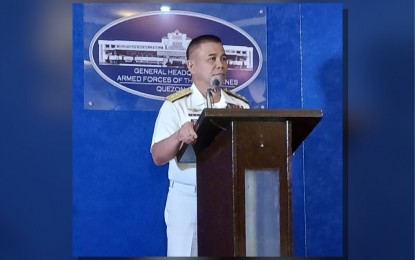
Philippine Navy spokesperson for WPS Rear Admiral Roy Vincent Trinidad (PNA file photo by Priam F. Nepomuceno)
MANILA – The government is mulling all its options in resolving the continued Chinese encroachment in the West Philippine Sea (WPS), a ranking naval official said Tuesday.
"There are many approaches that could be taken. We haven't exhausted all approaches (yet)," Philippine Navy (PN) spokesperson for the WPS Rear Admiral Roy Vincent Trinidad said.
He denied that continued Chinese presence in the WPS, especially in Ayungin and Escoda (also known as Sabina) Shoals, constitute a "form of limited sea control" or a "blockade."
"No. I call them as illegal presence, coercive and aggressive actions, and deceptive messaging," Trinidad said.
Monitoring from Sept. 17 to 23 shows that 251 Chinese ships were spotted in the WPS, the majority of them detected in Ayungin and Escoda, the highest concentration of Chinese ships in the WPS so far this year, the Navy said.
"At the highest level of government, there are a range of different options available. These options have not been exhausted yet. The AFP (Armed Forces of the Philippines) has a particular role to play under the whole-of-government effort," Trinidad said. "Whatever is decided upon, the AFP will implement."
He clarified that the Philippine military did not lose its presence in Escoda Shoal despite the departure of the Philippine Coast Guard's BRP Teresa Magbanua (MRRV-9701) on Sept. 14.
"We have always been there. The objective is monitoring. Again, (as) I mentioned, this is not just physical. There are different capabilities that we have right now to be able to monitor not only Escoda, but the entire WPS," he added.
Trinidad said monitoring the area could be done on sea, land, or through space-based systems, noting that the Navy would not be deterred in going about its regular routine.
"We'll keep performing our mandate and keep monitoring our shoals and reefs and shallow areas," he added.
Security ties
Senate President Francis Escudero, meanwhile, said security agreements with allies are effective deterrence to China’s acts of aggression.
On July 8, the Philippines signed the Reciprocal Access Agreement (RAA) with Japan in order to strengthen bilateral defense cooperation.
The government is also pursuing similar agreements with Vietnam, France and Germany.
"I believe these agreements -- the RAA and similar agreements with our allies -- will enable us to provide an effective deterrence while our military is not strong enough to provide that kind of deterrence," Escudero said during a forum with the international media on Tuesday.
The RAA with Japan has yet to be transmitted to the Senate for its concurrence, but as far as Escudero is concerned, the RAA and other similar treaties with the allies of the Philippines as "extremely important."
For the Senate to concur with the ratification of the RAA within the year, Escudero said the Department of Foreign Affairs should already send the document because after October, the chamber will be focused on the plenary debates on the 2025 budget.
Escudero gave credit to President Ferdinand R. Marcos Jr. for bringing the matter of China's aggression in the WPS to the international stage.
"The fact that there are a lot of countries speaking out against them (China) is actually serving as a deterrent, too. That is what I think the President was able to do successfully. He was able to bring world attention to this issue and to rally our allies and those similarly-minded states to support the Philippines in fighting against a bully in this particular region," Escudero said.
"And he was able to make these states and governments understand that the West Philippine Sea is not isolated. It should be their concern as well. This should be elevated as one of their top concerns as well. That it is not only a problem of the Philippines. These agreements highlight the success of the President with respect to achieving this goal," he added.
While the government is building up its security and defense alliances with its allies, Escudero said it is important that the country continues to engage with China.
"I don't see any problem with engaging with China. We can agree to disagree. There is nothing wrong with engaging with China either on a one-on-one or on a regional setting. This can go on for the next 10, 20 years. But if engagement provides for an easier path toward peace, I will be willing to do that even if it takes 2,000 diplomatic protests to avoid war. I will be willing to do that," Escudero said. (PNA)
